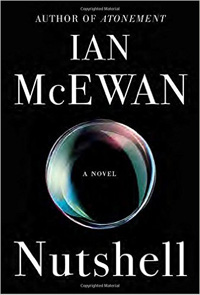 Ian McEwan, Nutshell; A Novel (New York: Doubleday, 2016), 197pp.
Ian McEwan, Nutshell; A Novel (New York: Doubleday, 2016), 197pp.
In this his seventeenth novel, the English writer Ian McEwan retells the story of Shakespeare's Hamlet, although he takes a creative gamble with a most unusual twist — the narrator of the story is a third trimester fetus, who, in the first two sentences of the book says, "So here I am, upside down in a woman. Arms patiently crossed, waiting, waiting and wondering who I'm in, what I'm in for."
He's in his mother Trudy, who has left his father John, and who has taken as her lover his uncle Claude. And what he's "in for" is at one level a very simple and common story, as old as human history, but, this being Hamlet in the hands of McEwan, he's in for a dark tale of the complexity of the human heart with all its jealousy, deceit, stupidity, guilt, and regret.
John Cairncross is a publisher and wannabe poet. He's in debt, overweight, and separated from Trudy so that they can each "find the time and space" to grow and reconnect. Trudy has expelled John from his childhood Georgian mansion, which is a dilapidated wreck of filth and squalor — but nonetheless still worth seven million pounds. She has taken up residence there with her lover Claude, the younger brother of John, a property developer, and a "dull-brained yokel."
The fetus-narrator surmises his situation: "So. My mother has preferred my father's brother, cheated her husband, ruined her son. My uncle has stolen his brother's wife, deceived his nephew's father, grossly insulted his sister-in-law's son. My father by nature is defenseless, as I am by circumstance." Pressed against Trudy's stomach day and night, he's witness to "conspirators in a vile enterprise," he hears "pillow talk of deadly intent" and "plans for a dreadful event." When four police show up at their doorstep on the last page of the book, Claude and Trudy contemplate all that has happened: "It's over. It's not a good end. It was never going to be."


